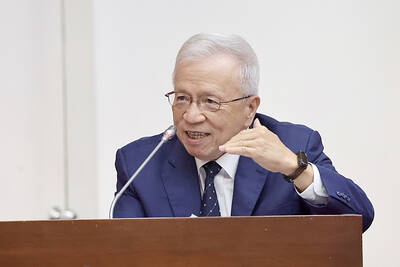WiMAX operator Global Mobile Corp (全球一動) said it is planning to switch over to Long Term Evolution (LTE) technology because the latter appears to have gained better momentum than WiMAX to be the next dominant 4G standard.
Although Global Mobile’s current infrastructure and base stations are running on WiMAX technology, they are compatible with LTE, chairperson Rosemary Ho (何薇玲) told reporters yesterday at an event to commemorate the first anniversary of its WiMAX service in Taipei.
When Global Mobile’s WiMAX coverage hits more than 70 percent, the company will apply to the government to change its license from WiMAX to LTE, Ho said.
The government mandates that the six WiMAX licensees — which also include Tatung InfoComm Co (大同電信), Vmax Telecom Co (威邁思), Far EasTone Telecommunications Co (遠傳電信), Vee Time Corp (威達雲端電訊) and International Telecom Corp (大眾電信) — must increase their 4G coverage to at least 70 percent before they can apply to switch to LTE.
To hit the 70 percent coverage target, Global Mobile has to have at least 1,000 base stations deployed — a number which Ho said should be achieved by the end of this year.
However, “the switch to LTE has several hurdles to overcome,” Ho said, adding that one is commercial viability, because LTE equipment is far costlier than WiMAX equipment, and that will dampen consumers’ willingness to subscribe.
Intel Corp, the backer of WiMAX, incorporated its WiMAX Program Office with other divisions in the middle of last year, spreading fear that it was downsizing WiMAX development.
According to ABI Research, LTE is set to gain critical momentum from the second quarter. By the end of the year, there will be about 16 million global subscribers using LTE mobile devices, such as smartphones.
Twelve countries have launched commercial LTE services, it said.
In Germany, T-Mobile’s LTE service, “Call & Surf via Funk,” is priced at US$53 a month in districts where xDSL fixed-line broadband services are limited.
The end-user is entitled to a fixed telephone line and an LTE connection, using a wireless router that offers download speeds of up to 3Mbps.
In Japan, NTT DoCoMo’s LTE service, called “Xi,” allows customers to enjoy high broadband speeds in the Tokyo, Nagoya and Osaka areas. Population coverage stands at 7 percent through the coverage of 1,000 base stations.
NTT DoCoMo aims to attain 70 percent coverage from 35,000 base stations by 2014. Monthly tariffs will be between US$12 and US$79, according to ABI Research.
Meanwhile, Global Mobile said it is in talks with China Mobile Ltd (中國移動) to offer the world’s top mobile operator its 4G technology when the latter secures a 4G license from the Chinese government.
Global Mobile is aiming to boost its number of subscribers to 160,000 this year, up from 20,000 members.
It aims to have 250,000 users next year.

JITTERS: Nexperia has a 20 percent market share for chips powering simpler features such as window controls, and changing supply chains could take years European carmakers are looking into ways to scratch components made with parts from China, spooked by deepening geopolitical spats playing out through chipmaker Nexperia BV and Beijing’s export controls on rare earths. To protect operations from trade ructions, several automakers are pushing major suppliers to find permanent alternatives to Chinese semiconductors, people familiar with the matter said. The industry is considering broader changes to its supply chain to adapt to shifting geopolitics, Europe’s main suppliers lobby CLEPA head Matthias Zink said. “We had some indications already — questions like: ‘How can you supply me without this dependency on China?’” Zink, who also

At least US$50 million for the freedom of an Emirati sheikh: That is the king’s ransom paid two weeks ago to militants linked to al-Qaeda who are pushing to topple the Malian government and impose Islamic law. Alongside a crippling fuel blockade, the Group for the Support of Islam and Muslims (JNIM) has made kidnapping wealthy foreigners for a ransom a pillar of its strategy of “economic jihad.” Its goal: Oust the junta, which has struggled to contain Mali’s decade-long insurgency since taking power following back-to-back coups in 2020 and 2021, by scaring away investors and paralyzing the west African country’s economy.

BUST FEARS: While a KMT legislator asked if an AI bubble could affect Taiwan, the DGBAS minister said the sector appears on track to continue growing The local property market has cooled down moderately following a series of credit control measures designed to contain speculation, the central bank said yesterday, while remaining tight-lipped about potential rule relaxations. Lawmakers in a meeting of the legislature’s Finance Committee voiced concerns to central bank officials that the credit control measures have adversely affected the government’s tax income and small and medium-sized property developers, with limited positive effects. Housing prices have been climbing since 2016, even when the central bank imposed its first set of control measures in 2020, Chinese Nationalist Party (KMT) Legislator Lo Ting-wei (羅廷瑋) said. “Since the second half of

Taiwan Semiconductor Manufacturing Co (TSMC, 台積電) received about NT$147 billion (US$4.71 billion) in subsidies from the US, Japanese, German and Chinese governments over the past two years for its global expansion. Financial data compiled by the world’s largest contract chipmaker showed the company secured NT$4.77 billion in subsidies from the governments in the third quarter, bringing the total for the first three quarters of the year to about NT$71.9 billion. Along with the NT$75.16 billion in financial aid TSMC received last year, the chipmaker obtained NT$147 billion in subsidies in almost two years, the data showed. The subsidies received by its subsidiaries —